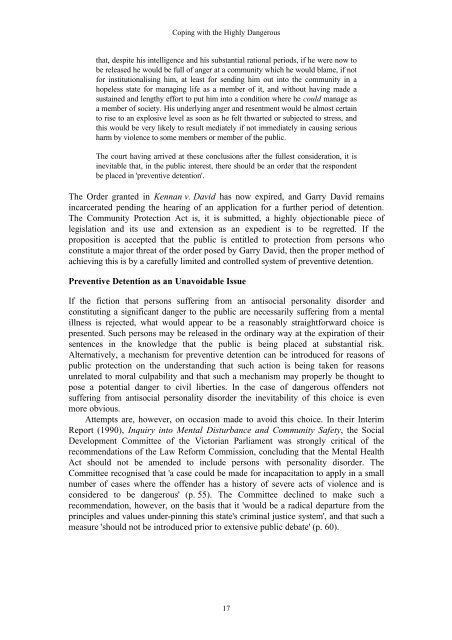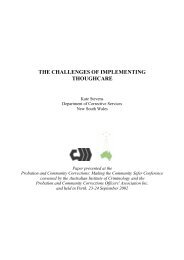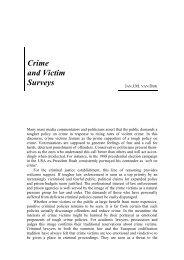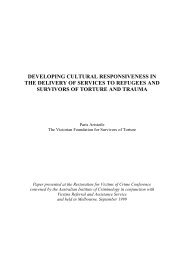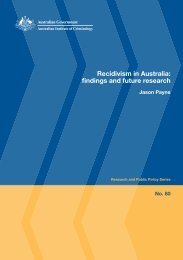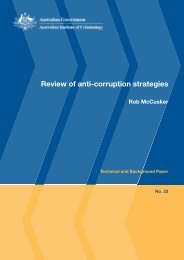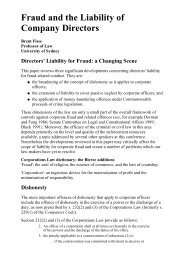Coping with the highly dangerous : issues of principle raised by ...
Coping with the highly dangerous : issues of principle raised by ...
Coping with the highly dangerous : issues of principle raised by ...
Create successful ePaper yourself
Turn your PDF publications into a flip-book with our unique Google optimized e-Paper software.
<strong>Coping</strong> <strong>with</strong> <strong>the</strong> Highly Dangerous<br />
that, despite his intelligence and his substantial rational periods, if he were now to<br />
be released he would be full <strong>of</strong> anger at a community which he would blame, if not<br />
for institutionalising him, at least for sending him out into <strong>the</strong> community in a<br />
hopeless state for managing life as a member <strong>of</strong> it, and <strong>with</strong>out having made a<br />
sustained and lengthy effort to put him into a condition where he could manage as<br />
a member <strong>of</strong> society. His underlying anger and resentment would be almost certain<br />
to rise to an explosive level as soon as he felt thwarted or subjected to stress, and<br />
this would be very likely to result mediately if not immediately in causing serious<br />
harm <strong>by</strong> violence to some members or member <strong>of</strong> <strong>the</strong> public.<br />
The court having arrived at <strong>the</strong>se conclusions after <strong>the</strong> fullest consideration, it is<br />
inevitable that, in <strong>the</strong> public interest, <strong>the</strong>re should be an order that <strong>the</strong> respondent<br />
be placed in 'preventive detention'.<br />
The Order granted in Kennan v. David has now expired, and Garry David remains<br />
incarcerated pending <strong>the</strong> hearing <strong>of</strong> an application for a fur<strong>the</strong>r period <strong>of</strong> detention.<br />
The Community Protection Act is, it is submitted, a <strong>highly</strong> objectionable piece <strong>of</strong><br />
legislation and its use and extension as an expedient is to be regretted. If <strong>the</strong><br />
proposition is accepted that <strong>the</strong> public is entitled to protection from persons who<br />
constitute a major threat <strong>of</strong> <strong>the</strong> order posed <strong>by</strong> Garry David, <strong>the</strong>n <strong>the</strong> proper method <strong>of</strong><br />
achieving this is <strong>by</strong> a carefully limited and controlled system <strong>of</strong> preventive detention.<br />
Preventive Detention as an Unavoidable Issue<br />
If <strong>the</strong> fiction that persons suffering from an antisocial personality disorder and<br />
constituting a significant danger to <strong>the</strong> public are necessarily suffering from a mental<br />
illness is rejected, what would appear to be a reasonably straightforward choice is<br />
presented. Such persons may be released in <strong>the</strong> ordinary way at <strong>the</strong> expiration <strong>of</strong> <strong>the</strong>ir<br />
sentences in <strong>the</strong> knowledge that <strong>the</strong> public is being placed at substantial risk.<br />
Alternatively, a mechanism for preventive detention can be introduced for reasons <strong>of</strong><br />
public protection on <strong>the</strong> understanding that such action is being taken for reasons<br />
unrelated to moral culpability and that such a mechanism may properly be thought to<br />
pose a potential danger to civil liberties. In <strong>the</strong> case <strong>of</strong> <strong>dangerous</strong> <strong>of</strong>fenders not<br />
suffering from antisocial personality disorder <strong>the</strong> inevitability <strong>of</strong> this choice is even<br />
more obvious.<br />
Attempts are, however, on occasion made to avoid this choice. In <strong>the</strong>ir Interim<br />
Report (1990), Inquiry into Mental Disturbance and Community Safety, <strong>the</strong> Social<br />
Development Committee <strong>of</strong> <strong>the</strong> Victorian Parliament was strongly critical <strong>of</strong> <strong>the</strong><br />
recommendations <strong>of</strong> <strong>the</strong> Law Reform Commission, concluding that <strong>the</strong> Mental Health<br />
Act should not be amended to include persons <strong>with</strong> personality disorder. The<br />
Committee recognised that 'a case could be made for incapacitation to apply in a small<br />
number <strong>of</strong> cases where <strong>the</strong> <strong>of</strong>fender has a history <strong>of</strong> severe acts <strong>of</strong> violence and is<br />
considered to be <strong>dangerous</strong>' (p. 55). The Committee declined to make such a<br />
recommendation, however, on <strong>the</strong> basis that it 'would be a radical departure from <strong>the</strong><br />
<strong>principle</strong>s and values under-pinning this state's criminal justice system', and that such a<br />
measure 'should not be introduced prior to extensive public debate' (p. 60).<br />
17


